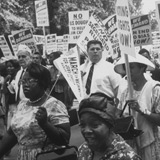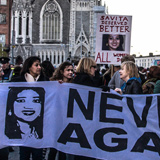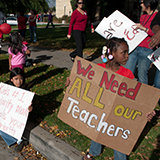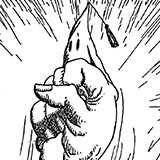
Back to the Future
Pulsating with racial and national anxieties, cyberpunk icon William Gibson’s future America is not so different from the one we know.


Pulsating with racial and national anxieties, cyberpunk icon William Gibson’s future America is not so different from the one we know.

An interview with Thomas Laqueur about his book The Work of the Dead: A Cultural History of Mortal Remains.

Social change is seldom either as incremental or predictable as insiders suggest. Instead, movements win by changing the political weather, turning demands considered unrealistic into ones that can no longer be ignored.

Can the Latin American left really be divided into a moderate, social democratic “right left” and an authoritarian, populist “wrong” one?

Following the arrest of six children in immigration raids, public school teachers in North Carolina are rallying to protect their students from deportation.

Today’s embrace of “innovation” in higher ed advances the interests of the business elite over those of educators or students.

No matter who becomes the Democrats’ nominee, Bernie Sanders’s campaign marks a sea change within the Democratic Party.

Last May, Ireland made history by becoming the first nation to legalize same-sex marriage by popular vote. Will abortion rights—the final stronghold of Catholic morality in the island nation—be next?

While childcare costs have soared, wages in the industry have stayed flat—leaving nearly half of childcare workers dependent on public benefits to survive. Why is the labor of educating children worth so little?

Janae Bonsu, from Black Youth Project 100, talks about the group’s “Agenda to Build Black Futures,” and why we need to think of economic justice and racial justice as intertwined.

The city of Ferguson has reneged on its promises to reform policing practices. Its current standoff with the Justice Department reveals the stubbornness of a municipal system that combines handouts to big corporations with predatory fines for the poor.

By reframing war in terms of “moral injury,” philosopher Nancy Sherman dodges the question of who is responsible for its horrors in the first place.

Why does the white-haired firebrand from Vermont insist on identifying himself with socialism, a political faith that has never been popular in the United States?

An interview with historian Lisa McGirr about her new book The War On Alcohol, and why Prohibition was more important than most people think.

The Gulf countries’ migrant labor regime is brutal. But calling it “slavery” obscures what is really a highly modern system of exploitation—and the struggles of workers themselves to change it.